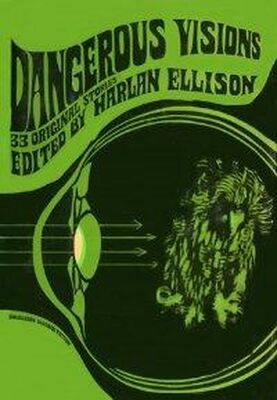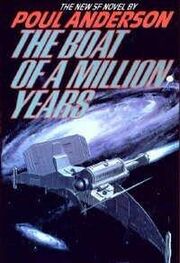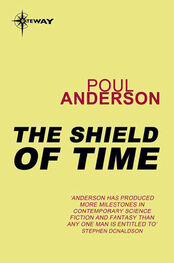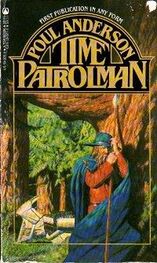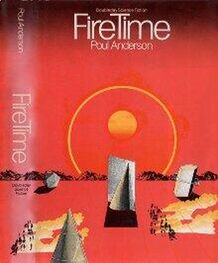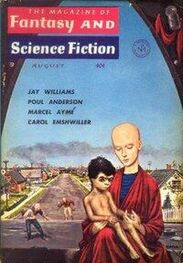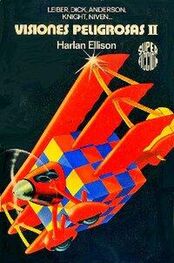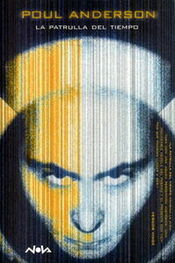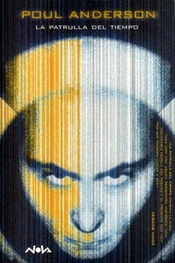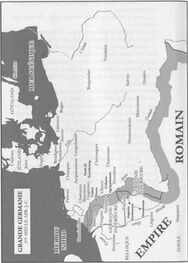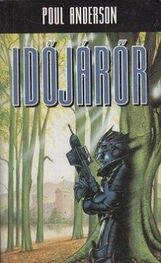The memory of people in Ernvik and Varady—gusty, generous people whose friendship he would have liked to keep—had nagged him awhile. But he put that aside too. There were other worlds, an endlessness of them.
A signboard creaked in the wind. The Brotherhood of Hunyadi and Ivar, Shipfolk. Good camouflage, that, in a town where every second enterprise was bent seaward. He ran to the second floor. The stairs clattered under his boots.
He spread his palm before a chart on the wall. A hidden scanner identified his fingerpatterns and a hidden door opened. The room beyond was wainscoted in local fashion. But its clean proportions spoke of home; and a Nike statuette spread wings on a shelf.
Nike… Niki…I’m coming back to you! The heart leaped in him.
Daimonax Aristides looked up from his desk. Jason sometimes wondered if anything could rock the calm of that man. “Rejoice!” the deep voice boomed. “What brings you here?”
“Bad news, I’m afraid.”
“So? Your attitude suggests the matter isn’t catastrophic.” Daimonax’s big frame left his chair, went to the wine cabinet, filled a pair of chaste and beautiful goblets, and relaxed on a couch. “Come, tell me.”
Jason joined him. “Unknowingly,” he said, “I violated what appears to be a prime taboo. I was lucky to get away alive.”
“Eh.” Daimonax stroked his iron-gray beard. “Not the first such turn, or the last. We fumble our way toward knowledge, but reality will always surprise us.… Well, congratulations on your whole skin. I’d have hated to mourn you.”
Solemnly, they poured a libation before they drank. The rational man recognizes his own need for ceremony; and why not draw it from otherwise outgrown myth? Besides, the floor was stainproof.
“Do you feel ready to report?” Daimonax asked.
“Yes, I ordered the data in my head on the way here.”
Daimonax switched on a recorder, spoke a few cataloguing words and said, “Proceed.”
Jason flattered himself that his statement was well arranged: clear, frank and full. But as he spoke, against his will experience came back to him, not in the brain but in the guts. He saw waves sparkle on that greatest of the Pentalimne; he walked the halls of Ernvik castle with eager and wondering young Leif; he faced an Ottar become beast; he stole from the keep and overpowered a guard and by-passed the controls of a car with shaking fingers; he fled down an empty road and stumbled through an empty forest; Bela spat and his triumph was suddenly ashen. At the end, he could not refrain:
“Why wasn’t I informed? I’d have taken care. But they said this was a free and healthy folk, before marriage anyway. How could I know?”
“An oversight,” Daimonax agreed. “But we haven’t been in this business so long that we don’t still tend to take too much for granted.”
“Why are we here? What have we to learn from these barbarians? With infinity to explore, why are we wasting ourselves on the second most ghastly world we’ve found?”
Daimonax turned off the recorder. For a time there was silence between the men. Wheels trundled outside, laughter and a snatch of song drifted through the window, the ocean blazed under a low sun.
“You do not know?” Daimonax asked at last, softly.
“Well… scientific interest, of course—” Jason swallowed. “I’m sorry. The Institute works for sound reasons. In the American history we’re observing ways that man can go wrong. I suppose here also.”
Daimonax shook his head. “No.”
“What?”
“We are learning something far too precious to give up,” Daimonax said. “The lesson is humbling, but our smug Eutopia will be the better for some humility. You weren’t aware of it, because to date we haven’t sufficient hard facts to publish any conclusions. And then, you are new in the profession, and your first assignment was elsewhen. But you see, we have excellent reason to believe that Westfall is also the Good Land.”
“Impossible,” Jason whispered.
Daimonax smiled and took a sip of wine. “Think,” he said. “What does man require? First, the biological necessities, food, shelter, medicine, sex, a healthful and reasonably safe environment in which to raise his children. Second, the special human need to strive, learn, create. Well, don’t they have these things here?”
“One could say the same for any Stone Age tribe. You can’t equate contentment with happiness.”
“Of course not. And if anything, is not ordered, unified, planned Eutopia the country of the cows? We have ended every conflict, to the very conflict of man with his own soul; we have mastered the planets; the stars are too distant; were the God not so good as to make possible the parachronion, what would be left for us?”
“Do you mean—” Jason groped after words. He reminded himself that it was not sane to take umbrage at any mere statement, however outrageous. “Without fighting, clannishness, superstition, ritual and taboo… man has nothing?”
“More or less that. Society must have structure and meaning. But nature does not dictate what structure or what meaning. Our rationalism is a non-rational choice. Our leashing of the purely animal within us is simply another taboo. We may love as we please, but not hate as we please. So are we more free than men in Westfall?”
“But surely some cultures are better than others!”
“I do not deny that,” Daimonax said; “I only point out that each has its price. For what we enjoy at home, we pay dearly. We do not allow ourselves a single unthinking, merely felt impulse. By excluding danger and hardship, by eliminating distinctions between men, we leave no hopes of victory. Worst, perhaps, is this: that we have become pure individuals. We belong to no one. Our sole obligation is negative, not to compel any other individual. The state—an engineered organization, a faceless undemanding mechanism—takes care of each need and each hurt. Where is loyalty unto death? Where is the intimacy of an entire shared lifetime? We play at ceremonies, but because we know they are arbitrary gestures, what is their value? Because we have made our world one, where are color and contrast, where is pride in being peculiarly ourselves?
“Now these Westfall people, with all their faults, do know who they are, what they are, what they belong to and what belongs to them. Tradition is not buried in books but is part of life; and so their dead remain with them in loving memory. Their problems are real; hence their successes are real. They believe in their rites. The family, the kingdom, the race is something to live and die for. They use their brains less, perhaps—though even that I am not pertain of—but they use nerves, glands, muscles more. So they know an aspect of being human which our careful world has denied itself.
“If they have kept this while creating science and machine technology, should we not try to learn from them?”
Jason had no answer.
Eventually Daimonax said he might as well return to Eutopia. After a vacation, he could be reassigned to some history he might find more congenial. They parted in friendly wise.
The parachronion hummed. Energies pulsed between the universes. The gate opened and Jason stepped through.
He entered a glazed colonnade. White Neathenai swept in grace and serenity down to the water. The man who received him was a philosopher. Decent tunic and sandals hung ready to be donned. From somewhere resounded a lyre.
Joy trembled in Jason. Leif Ottarsson fell out of memory. He had only been tempted in his loneliness by a chance resemblance to his beloved. Now he was home. And Niki waited for him, Nikias Demostheneou, most beautiful and enchanting of boys.
